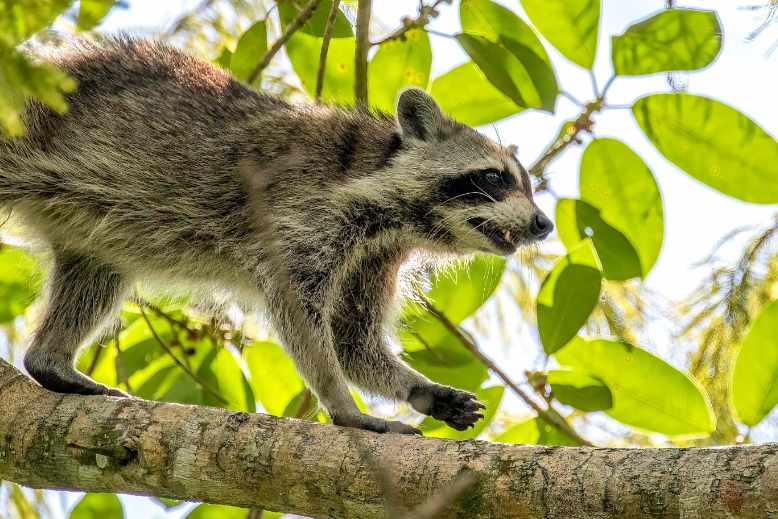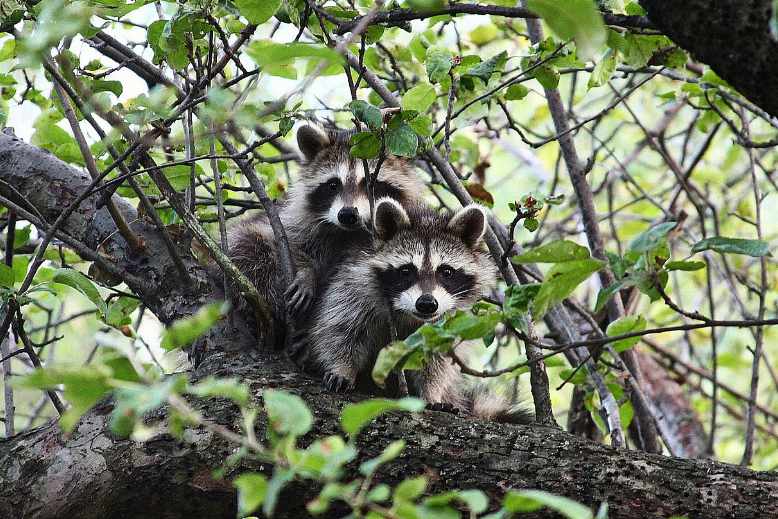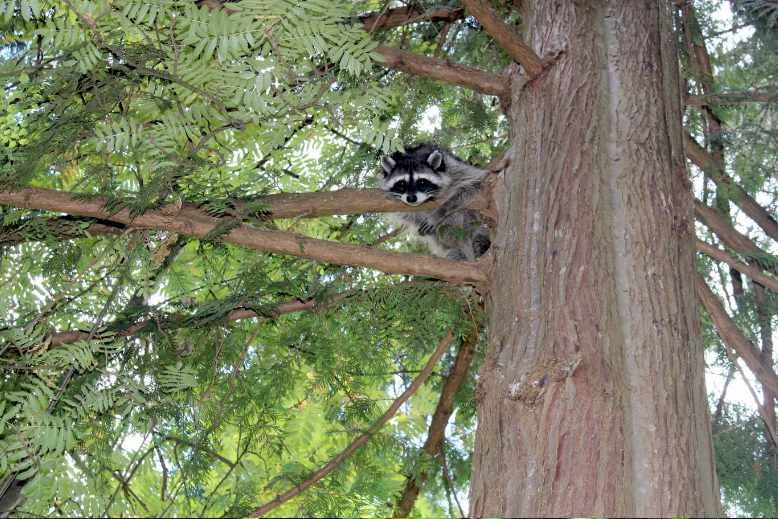Why do raccoons fight in trees? Mother raccoons make a nest in high places like trees. When a male raccoon climbs on the tree in an attempt to invade their nesting site, they fight in trees to secure their little ones. This tree fight can be fierce and may lead to the demise of either participant. On the other hand, male raccoons often go outside their territory. When they come across other raccoons of similar gender, they fight to show their dominance. You can also observe some raccoon fights in trees during the breeding season. The reasons behind these fights are pretty general; to protect the young ones or to secure a potential mate.
Raccoons are cute-looking creatures. But they aren’t always like that. A raccoon can vary between being a sweet soul to a violently aggressive animal, depending on the situation. Unlike other animals, raccoons do everything to avoid fighting. They are generally peaceful, but you can still find them fighting on trees with each other.
So, why do raccoons fight in trees? This article will look into some of the interesting reasons behind raccoon fights and the guidance on what you should do if there is a raccoon fight.
Keep on reading to learn more!
Why do raccoons fight in trees?

Raccoons are generally calm animals. They aren’t territorial and barely fight. The most common reasons behind raccoon fights are self-defense, potential mates, babies, and food.
These animals act as A-plus students and avoid conflict unless they are attacked or highly aggressive. Unlike some birds and animals, raccoons rarely fight to the death. Small raccoons usually withdraw fight from the dominant ones. These animals have a tendency to back down and respect the elder raccoons. This is because the elder ones are generally bigger in size.
And nope! Gender has nothing to do with it.
Although raccoons do fight for food and resources, mostly, these fights aren’t that intense. Raccoons are not violent, but they are great defendants. Their long sharp teeth, strong jaws, and claws help them defend themselves. So if two raccoons are toe-to-toe, it isn’t going to be easy for either one.
Reasons behind raccoon fights
- For food and water
Raccoons are not picky. They will eat anything from fruits to sweets and meat without exception. They eat just like a squirrel. Raccoons avoid disputes, so they also prefer easy meals. They don’t like hunting and fighting back. That’s why you find them enjoying leftovers from your trash bins.
However, if a raccoon cannot find something to eat, it can attack other small animals. Unavailability of food can make a raccoon fight with other raccoons. These animals can also fight over things they like, such as anything glittery or shiny.
- To protect their babies and themselves.

Raccoons are not fighters. However, if a raccoon is under attack, it will try its best to protect itself and its family. A defensive raccoon can attack a cat, a dog, other animals, or even a human. Though they are not territorial and rarely fight over territory, raccoons know how to defend their babies, their nest, and themselves very well.
Mother raccoons are incredibly protective. They usually keep their little ones on trees. If mother raccoons feel threatened by any other raccoon or animal, they won’t mind fighting till death. Male raccoons also fight to protect their young ones during the breeding season. They guard their nests when the females are out for food. But other than that, males don’t help female raccoons in raising their babies.
Both mother and father raccoons are pretty sensitive about their infants. They don’t allow anyone to approach their nest, whether it is a raccoon or a human. Parents raccoons protect their kids at every cost and are willing to attack if someone or something comes near their nest or tree. That’s why when people see raccoons fighting on trees, they believe that these animals are violent.
Am, yeah, they are parents!
- To secure a mate
Raccoon’s mating season happens in January and June. And like any other animal, raccoons also choose their potential mate. However, male raccoons have to compete with other suitors to mate with the female. This competition usually ends up in a fight. However, newly matured raccoons don’t compete with older ones, and the most powerful one eventually mates with the female raccoon.
But the situation turns into a fight when two older raccoons compete to find the most dominant one. Only the fight winner can mate with the female raccoon.
If you don’t know, female raccoon mates with only one partner while males try to mate with multiple raccoons.
- Severe disease
If raccoons are affected by some virus, such as rabies, they will fight without any reason. Ill raccoons act as mentally ill people. Rabies takes over their brain and body, and they attack unprovoked.
Healthy raccoons try to avoid such fights. But if the healthy ones cannot get away, they fight back with the ill, causing disease transmission.
Symptoms of rabies in raccoons are
- Extreme aggression towards other raccoons, animals, and humans
- Seeming lost, white forming at the mouth, confusion
- Unexpected movements
- Light and sound sensitivity
- Discharge from mouth, nose, and eyes.
- Self-mutilation, high pitched noises
- Matted or wet fur on the face
If you encounter a sick raccoon, walk away as far as you can. Do not make any attempt to remove it yourself. These animals can transmit diseases, and even a single scratch can be fatal. So it’s better not to bother them yourself. Let the professionals handle it.
- For nesting places
You probably don’t know, but raccoons like to have more than one shelter. Mother raccoons build their nest in high places to keep their newborns safe. Usually, they prefer keeping their young ones high up on trees and attics. When a male raccoon tries to reach the nest, mothers brutally fight to secure their little ones. This fight only ends if one of them is dead.
Do raccoons fight to the death?
Raccoons are social animals that prefer living in a group. They usually don’t attack, but they know how to safeguard themselves if there is a fight. If necessary, they can fight to the death. Raccoons don’t fight with the dominant looking once, but if the smaller ones don’t step back from the dispute, the battle continues until one is without life.
This also happens if a raccoon habitat has limited resources. Lack of water, food, and nesting sites make a raccoon steal and fight with other raccoons.
Do raccoons fight with humans?
Depending on the situation, they do.

Raccoons normally don’t fight with humans. They try to find food from our trash bins and have a tendency to run away at the sight of humans. But if a raccoon feels defensive or under attack, it will produce some sounds to scare the big predators (humans). These sounds indicate that the raccoon is going to attack you.
Raccoons living in cities don’t mind human presence. Some of them may hiss at you, but they will not attack you, your pet, or your property. But if you feel they are trying to attack, do not fight back.
Don’t be violet to move a raccoon, and never throw anything at it.
Raccoons are prone to several diseases. They can be the carriers of rabies, Baylis Ascaris, and roundworms. Symptoms of rabies don’t appear until the virus has spread completely. This disease is so horrifying that it can even kill a human. Even a scratch can transmit a dangerous disease to you. So, it’s better not to mess with fighting raccoons.
What to do if a raccoon attacks you?
If a raccoon attacks you, your friend, or your property, follow the tips to protect yourself.
- Wear thick gloves and clothes so that their sharp teeth and claws cannot penetrate.
- Use thick boots, gloves and, if possible, put on a helmet.
- Cover yourself completely. Keep in mind raccoons are agile creatures that can jump from high places without being hurt.
- Don’t try to pick it up or handle it. The animal might be more scared of you than you are of it.
- Do not try to trap it as it will make the situation even worse. The animal may feel trapped and is likely to attack you more aggressively. Keep in mind raccoons may be small, but they are pretty dangerous.
- If a raccoon bites or scratches you, seek medical attention as soon as possible.
How to get rid of raccoons?
The internet is flooded with tips and tricks that you can follow to get rid of raccoons. Some of the most effective tips are here to keep raccoons away from your trees, attic, property, and home:
- Get rid of their food and water resources
Raccoons never nest in a place where there is no food or water for them to survive. Now you might wonder, “who even feeds a raccoon?” Well, even if you are not offering them food directly, they still get it through your trash cans. Outdoor trash cans are basically an invitation to the raccoons. Similarly, chicken coops and fruits can also attract them.
To tackle the situation, you can simply place the trashcan inside or lock the lid to secure the bin so that the raccoon cannot knock it over.
- Get rid of their shelter.
Raccoons need a place near food and water where they can nest. They often like to nest in the attic. So if your house has an attic, make sure it is closed, and the raccoons cannot enter it.
Try to trim any thick bushes in your backyard, as raccoons can nest there. Without food, water sources, and nesting places, raccoons won’t be able to be your unwanted guest.
- Use radio sounds
Raccoons don’t like loud noises. If you want to make raccoons go away, leave a radio near their nest.
- Use predator urine
It may sound strange and disgusting, but fresh predator urine is a sign of a nearby predator. If a raccoon smells the urine, it will be on high alert and may migrate as well.
- Seal the small openings
Seal up the small openings in your house. These openings let the smell of food waft out, which attracts raccoons.
- Use electric fence
Having a fence around your property won’t save it from raccoons. These animals are great climbers, and they can easily climb your fence if they want to. Therefore, it is recommended to use an electric fence for house protection.
- Secure pet food
Raccoons will eat whatever they can get, and pet food has no exception. So, if you are a pet owner, make sure to bring pet food inside before sunset to keep raccoons from infesting your home.
- Monitor your bird feed
Raccoons eat bird feed as well. But unlike pet food, it may be a little difficult for you to remove bird feed every night. We suggest using special bird feeders or shepherd hooks to prevent raccoons from eating bird feed in such situations.
- Clean up your yard
Raccoons like to create den sites in many places. Anything from your backyard can be their nest. It can be an untrimmed tree, a fallen tree, or a wood piece. So, it’s better to keep your yard neat and clean to prevent any future raccoon dens.
Will animal control remove raccoons?
Yes, it is wise to contact animal control to tackle the situation. Animal control raccoon removal services work with professionals who know how to remove wild animals without hurting them.
Wrapping Up
Raccoons are wild animals, and they have to fight for many reasons. Their nature is different than our household pets and can be vicious. They might be social and peaceful animals who don’t usually fight, but they can attack any human or animal in defense. The fight can happen anywhere, whether it is a tree attic, ground, street, or any place where they feel threatened.
Even if a raccoon isn’t fighting, it is still wise not to touch it as it can transmit many fatal diseases. These nocturnal animals are powerful than they seem to our normal eyes. So, to avoid any unwanted situations, it’s better to keep them away from your property.
